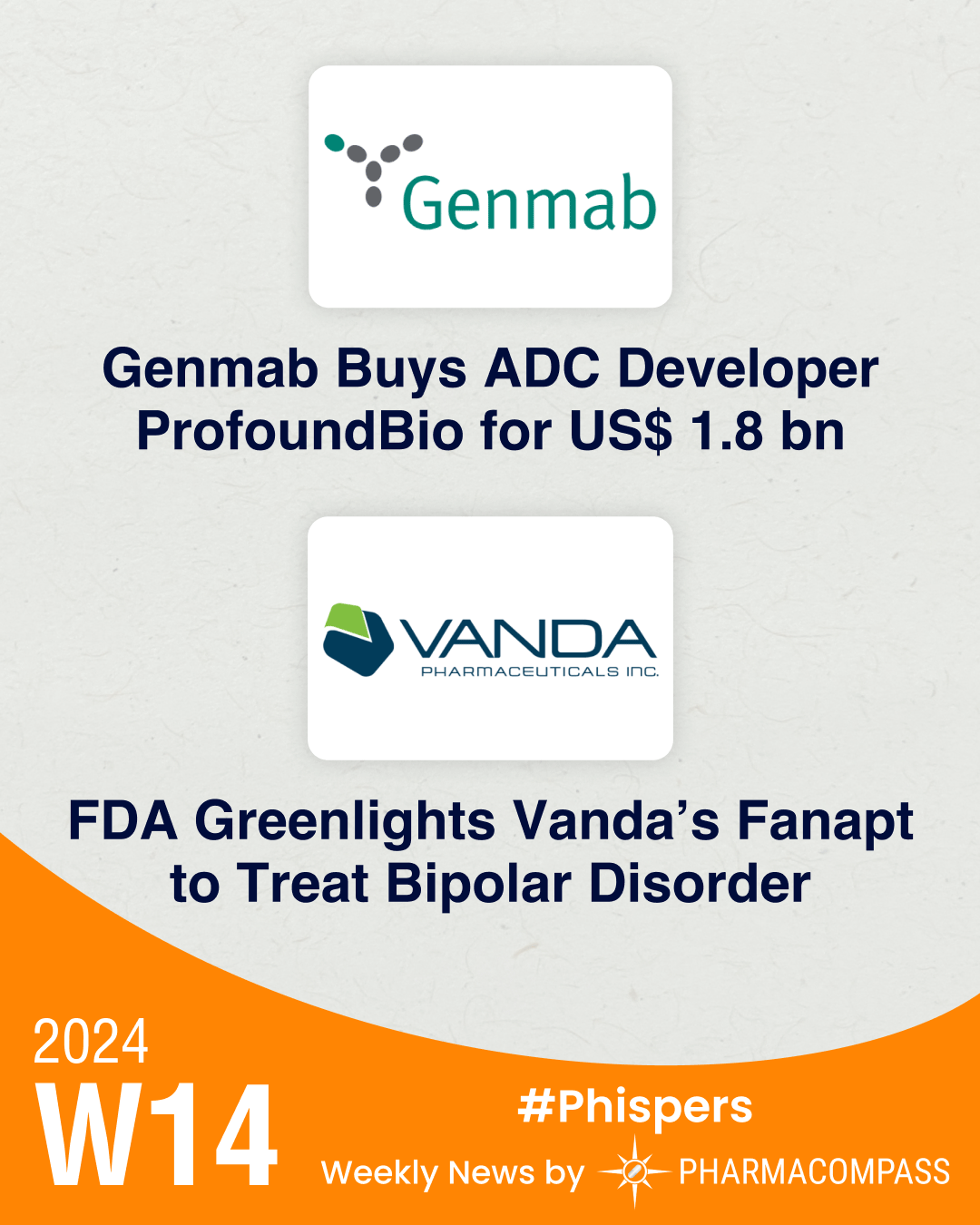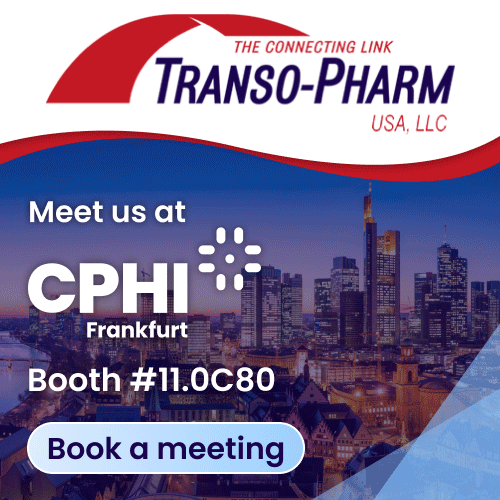
By PharmaCompass
2024-04-04
Impressions: 1,022 (Article) || 2 (Video)
April kicked off with Danish drugmaker Genmab buying ProfoundBio for US$ 1.8 billion in cash. ProfoundBio is a clinical stage biotech with three next generation antibody drug conjugates (ADCs) that should boost Genmab’s oncology portfolio.
In approvals, the United States Food and Drug Administration (FDA) greenlit Vanda Pharmaceuticals’ Fanapt tablets to treat manic or mixed episodes associated with bipolar-I disorder in adults. The agency also approved a new antibiotic from Basilea Pharmaceutica for three indications. And AstraZeneca’s Voydeya bagged FDA approval as an add-on therapy to the drugmaker’s blockbuster drugs in the treatment of a rare blood disorder, known as paroxysmal nocturnal haemoglobinuria (PNH).
The ever-increasing demand for glucagon-like peptide 1 (GLP-1) agonists is causing shortages and the FDA has said four doses of Mounjaro are likely to be in tight supply through April. Incidentally, a study published by Doctors Without Borders/Médecins Sans Frontières (MSF) in the Journal of the American Medical Association (JAMA) Network revealed a global double standard in access to this class of drugs.
Meanwhile, Biogen and Eisai have missed their March 2024 target to file a biologics license application (BLA) for a subcutaneous version of their Alzheimer’s disease therapy Leqembi (lecanemab).
Genmab buys next-generation ADC developer ProfoundBio for US$ 1.8 bn
The oncology space is witnessing a deal every month. In March, AstraZeneca had bought Fusion Pharmaceuticals for up to US$ 2.4 billion. In February, Novartis had acquired MorphoSys for US$ 2.9 billion and in January, Johnson & Johnson had said it would buy Ambrx Biopharma for about US$ 2 billion. And this month, Denmark’s Genmab has agreed to acquire privately-owned ProfoundBio for US$ 1.8 billion in cash.
The Seattle-based clinical-stage biotech has three next-generation ADC candidates and the move will boost Genmab’s oncology portfolio. ProfoundBio had recently received FDA’s fast track designation for its “potential best-in-class” treatment for ovarian cancer, known as Rina-S.
AbbVie acquires Landos: AbbVie will acquire Landos Biopharma for up to US$ 212 million in a bid to boost its portfolio of inflammatory and autoimmune diseases. Landos’ lead investigational asset NX-13 is currently in a mid-stage study for ulcerative colitis (UC).
Blue Wolf buys seven sites from Recipharm: Sweden’s Recipharm, a contract development and manufacturing organization (CDMO), has said US private equity firm Blue Wolf Capital Partners has committed to acquire seven of its sites, including five sites in Sweden and one each in France and Spain. Recipharm is looking to expand its biologics production capacity to take advantage of the increasing demand for cell and gene therapies. Blue Wolf will use the sites to create a new CDMO.
FDA okays Vanda’s Fanapt to treat bipolar disorder; approves antibiotic from Basilea
FDA has approved Vanda Pharmaceuticals’ Fanapt (iloperidone) tablets for treating manic or mixed episodes associated with bipolar-I disorder in adults. The atypical antipsychotic agent has been used for the treatment of patients with schizophrenia since its FDA approval in 2009. However, it has been increasingly facing competition in recent quarters. This second approval, for bipolar-I disorder patients who experience manic episodes that last at least seven days, could help revive Fanapt prescriptions. In a late-stage study, iloperidone helped reduce severity of core symptoms of mania when tested across 400 patients.
Meanwhile, a US appeals court has allowed Teva Pharmaceutical and Viatris to resurrect challenges to the final US patent on Johnson & Johnson’s blockbuster schizophrenia drug. Invega Sustenna (paliperidone palmitate) raked in US$ 4.1 billion last year including US$ 2.9 billion from the US market. The case will be sent back to a New Jersey federal court — it had ruled against Teva’s challenge of J&J’s patent in 2021.
New antibiotic from Basilea: FDA has approved Basilea Pharmaceutica’s Zevtera (ceftobiprole medocaril sodium for injection), an antibiotic for bacterial infections including multidrug-resistant strains. The US agency has okayed it for three conditions – treatment of adults with Staphylococcus aureus bacteremia, including those with right-sided infective endocarditis; adults with acute bacterial skin and skin structure infections; and adult and pediatric patients three months to less than 18 years old with community-acquired bacterial pneumonia.
Astra’s Voydeya given go-ahead as add-on therapy for rare blood disease
AstraZeneca’s Voydeya (danicopan) has been approved in the US as an add-on therapy to Ultomiris (ravulizumab) or Soliris (eculizumab) for the treatment of extravascular haemolysis (EVH) in adults with paroxysmal nocturnal haemoglobinuria (PNH).
PNH is a rare blood disease and EVH is a condition that causes red blood cell destruction outside of the blood vessels. Voydeya is a first-in-class, oral, factor D inhibitor developed as an add-on to Astra’s standard-of-care blockbuster drugs.
Mounjaro’s tight supply to continue; ‘GLP-1 drugs unaffordable in poor nations’, says study
FDA’s website now shows four doses of Mounjaro (tirzepatide) are expected to be in tight supply through April due to increased demand. Those include the 7.5, 10, 12.5, and 15 milligram doses. In early February, the agency had said the 10, 12.5 and 15 milligram doses would be in tight supply through early March.
Meanwhile, a study by Doctors Without Borders/Médecins Sans Frontières (MSF) has revealed that drug companies are pricing GLP-1 receptor agonists at almost 400 times the level necessary to make a profit. Those include Novo Nordisk’s Ozempic (semaglutide) and Eli Lilly’s Trulicity (dulaglutide), which are now a standard part of treatment in high-income countries. However, in low-income countries, they are unaffordable.
“Eli Lilly and Novo Nordisk can in no way supply the world with the amount of these medicines needed to meet global demand, so they must immediately relinquish their stranglehold and allow them to be produced by more manufacturers around the world,” MSF said.
Biogen, Eisai fail to submit BLA for subcutaneous Leqembi injection
The wait for a more convenient version of Biogen-Eisai’s Alzheimer’s disease drug Leqembi has become longer with the two companies missing their own deadline of submitting the biologics license application (BLA) for a subcutaneous version of Leqembi by March. The drug is currently being administered intravenously. The subcutaneous Leqembi is being proposed as a weekly maintenance regimen.
Meanwhile, the two companies have filed a supplemental BLA (sBLA) for a monthly intravenous maintenance dose schedule of Leqembi. If approved, this maintenance regimen will be available to patients who complete the biweekly intravenous initiation phase.
The PharmaCompass Newsletter – Sign Up, Stay Ahead
Feedback, help us to improve. Click here
Image Credit : Phisper Infographic by PharmaCompass license under CC BY 2.0
“ The article is based on the information available in public and which the author believes to be true. The author is not disseminating any information, which the author believes or knows, is confidential or in conflict with the privacy of any person. The views expressed or information supplied through this article is mere opinion and observation of the author. The author does not intend to defame, insult or, cause loss or damage to anyone, in any manner, through this article.”








